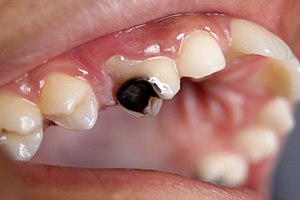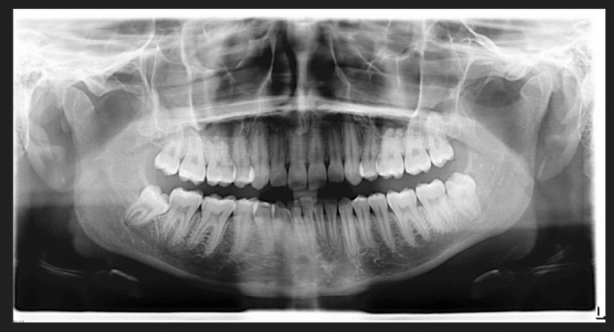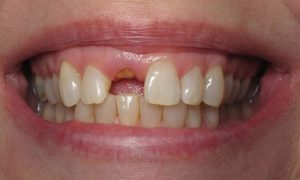Emergency Tooth Extraction Near Me in Rockville, Maryland
When you suffer a broken tooth, impacted tooth, abscess, or are diagnosed with a tooth infection, there could be any number of causes for each issue. For urgent situations, we offer emergency dental services to address immediate needs and prevent further complications.
But at least one thing is true about all of them: They come with tooth pain. In fact, the sensation may be so severe as to require an emergency tooth extraction.
Dental trauma, such as injuries from accidents that result in fractured or dislodged teeth, is also a common reason for emergency visits.
But have no fear: The emergency dentists at Rockville Dental Arts are here when you need emergency relief.
Our dental care specialists provide comprehensive oral care services for all your individual and family needs, from biannual cleanings to wisdom tooth removal to restorative dentistry—including dental bridges—and even emergency tooth removal.
But when you’re in serious pain from an impacted wisdom teeth or a broken tooth, all you care about is eliminating your discomfort.
We set aside time each day so in the event emergency is required, you can get it — fast.
We understand that patients have common concerns about costs, insurance coverage, and treatment options, and we provide transparent answers to help you make informed decisions.
For your convenience, we offer financing options to make emergency procedures more affordable and accessible.
Our business hours for non-emergency visits are Monday through Friday, 8am to 5pm, and we encourage patients to schedule appointments during these times.
Our dentist’s office is fully equipped to handle both routine and emergency cases, ensuring you receive the care you need when you need it.
What Happens During an Emergency Extraction Procedure?
We have a page dedicated to what you can expect from emergency surgical extraction, but here’s a quick rundown:
- Comprehensive review of your dental history and your medical conditions
- X-rays are taken to inspect the entire tooth and mouth, and to help plan emergency extractions
- If extraction is appropriate, the patient will sign a consent form
- We numb the area with topical and local anesthetic (usually Lidocaine)
- The dentist will loosen the tooth
- Your dentist will gently remove the tooth to minimize discomfort
- A gauze pad is placed over the area
Sometimes, a tooth cannot be repaired and must be extracted.
The nature of the emergency extraction depends on the needs of the patient. Emergency extractions are performed when immediate care is needed, such as in cases of severe pain, infection, or trauma. Tooth extractions may be necessary for teeth that cannot be saved.
A simple removal can be as quick as a few minutes, since there has been no bone loss.
A surgical extraction is usually longer and more involved, because it may require an incision of the gum tissue to be made around the problematic tooth.
In either case, the local anesthesia will make the experience virtually painless. If you had general anesthesia or iv sedation you will need someone to drive you home.
Additionally, most emergency tooth extraction procedures — meaning the removal of the tooth itself — are completed in less than 10 minutes. You may experience discomfort afterward, but your dentist or oral surgeon will offer solutions on how to minimize it. Immediate care is important to prevent further complications and ensure swift relief.
Temporary dental restoration options may be provided after extraction until a permanent solution is available.
How Long Does it Take the Hole to Close After An Emergency Tooth Extraction
If you just had a tooth pulled you want to know the basics of home care afterward.
Bite on the gauze pad for up to 30 minutes. When removed it will be soaked with blood. Do not worry. Inspect the area for continued bleeding. A little blood is okay. If the area is still oozing significantly then bite on a wet tea bag for another 20 minutes.
Keep the extraction site clean from food and debris but do not pick at it to prevent infection. Improper care can lead to further damage or infection. If you remove the blood clot, aka the scab, in the hole then you may end up with a dry socket and feel pain. If issues like dry socket are left untreated, they can result in further complications.
For 24 hours you should continue taking pain medication prescribed by your general dentist or oral surgeon.
If you have swelling in the cheeks it is okay to use an ice pack.
Brush and floss your teeth like normal but stay away from the socket. This helps protect the surrounding teeth from infection or debris during healing.
You should avoid smoking after tooth extraction. Smoking any substance is frowned upon because the chemicals you burn can end up in the wound and lead to more serious problems like infection, dry socket and inflammation.
What is Considered a True Dental Emergency?
The most common reasons and common reasons for emergency tooth extraction include severe decay, trauma, infection, and other dental problems that threaten the health of your teeth and gums.
Everyone experiences dental pain from time to time. Whether that pain qualifies as a genuine dental emergency — requiring immediate attention — isn’t quite as clear-cut. Not all dental emergencies require extraction, but some situations do when the tooth cannot be saved.
Every situation is different, but generally speaking, it’s when the life of the tooth is at stake that something will be called an emergency. Dental problems such as severe decay, infection, or a badly damaged tooth from trauma may require immediate intervention. In some cases, a root canal may be considered to save the tooth before extraction is necessary. Third molars, or wisdom teeth, are often involved in emergency extractions due to impaction or lack of space, leading to pain and infection.
For example, if a tooth is knocked out of place but is still connected to the gum, that qualifies as a scenario requiring immediate treatment. Or there is significant tooth decay causing a pain in the mouth.
If you have a knocked out tooth, handle it carefully by the crown, avoid touching the root, and place it in a cup of milk before contacting us at Rockville Dental Arts. We’ll take it from there. Badly damaged teeth that cannot be repaired may also require extraction.
If you are experiencing severe pain and cannot reach a dentist, visit the emergency room for pain relief and initial care. The goal is always to preserve your natural teeth whenever possible, but extraction is necessary when they cannot be saved.
Call, Text or Complete Contact Form to get a Free Consultation & 3D Xray
Call, Text or Complete Contact Form to get a Free Consultation & 3D Xray
What Symptoms Indicate You Need an Emergency Tooth Extraction?
While these two scenarios entail putting the missing molar, bicuspid or canine back in place, others may require a problematic tooth to be removed via surgical tooth extraction. The need for emergency tooth extraction is determined on a case-by-case basis, but some of the symptoms that may call for it include:
- Bleeding gums
- Localized swelling
- Broken or cracked tooth with tooth decay
- Excruciating pain
- Gum disease
- A growth or sore that won’t go away
Maintaining your dental health is crucial to help prevent dental emergencies like these. Untreated dental infections can also impact your overall health, making prompt care essential.
With these last two symptoms — severe pain and/or a growth — the discomfort may be so intolerable that it prevents you from falling asleep at night, or may wake you up from a sound slumber. Getting this issue adequately addressed could require an emergency tooth extraction if the problematic tooth is dead. Emergency tooth extractions are sometimes necessary to resolve severe symptoms and prevent further complications.
If you can feel a sore or see it while brushing, this may also be grounds for emergency extraction, depending on where the growth is located and the results of a biopsy. According to the American Cancer Society, over 54,000 people in the U.S. are diagnosed with oral cancer each year.
Emergency dental care is available for urgent situations like these, ensuring you receive prompt treatment. After an extraction, dentures may be considered as a restorative option to replace missing teeth. Be sure to check with your insurance company regarding coverage for emergency procedures. To help prevent emergencies, see your dentist regularly for checkups and early intervention.
When your long-term oral health is at stake, trust the emergency dentist experts at Rockville Dental Arts.
Contact us today or call your dentist; we aim to respond in an hour or less. If you are interested in same-day dental implants near you, reach out for more information. Or Text us 301-424-2030
Post-Extraction Care and Dental Care
Proper post-extraction care is essential for ensuring a smooth recovery and protecting your oral health after an emergency tooth extraction. Taking the right steps after your procedure can help prevent infection, reduce discomfort, and support proper healing of the extraction site.
After your emergency tooth extraction, your dentist will provide specific instructions tailored to your dental condition. It’s important to follow these guidelines closely. Typically, you’ll be advised to rest and avoid strenuous activity for the first 24 hours to minimize bleeding and swelling. Keeping your head elevated and applying an ice pack can help alleviate pain and reduce inflammation.
To prevent infection, avoid touching the extraction site with your fingers or tongue, and do not rinse your mouth vigorously for the first day. When you do rinse, use warm water or a gentle saltwater solution as recommended by your dentist. Maintaining good dental care is crucial—continue brushing and flossing your other teeth, but be careful to avoid the area where the tooth was removed.
Pain management is another key aspect of post-extraction care. Over-the-counter pain relievers or medications prescribed by your emergency dentist can help control discomfort. If you experience severe pain, swelling, or signs of infection such as fever or pus, contact your dental practice immediately for prompt treatment.
As you heal, stick to soft foods and avoid chewing near the extraction site. Refrain from smoking or using straws, as these actions can disrupt the blood clot and delay healing. Good oral hygiene and regular visits to your dentist will help ensure your mouth stays healthy and reduce the risk of future dental emergencies.
By following your dentist’s advice and practicing diligent dental care, you can support proper healing after a tooth extraction and protect your overall well-being.










